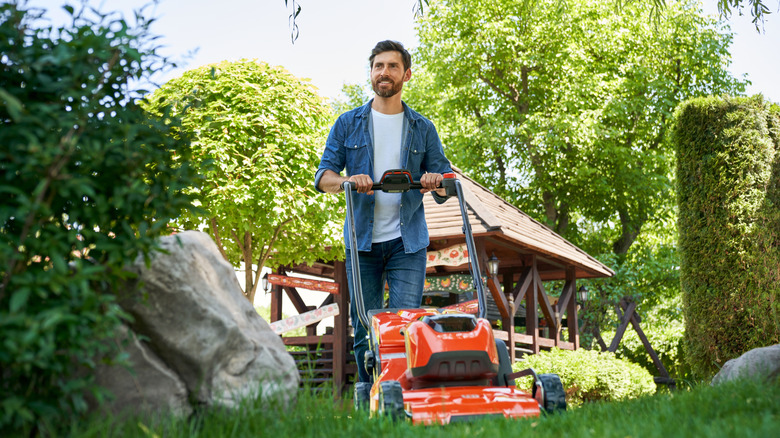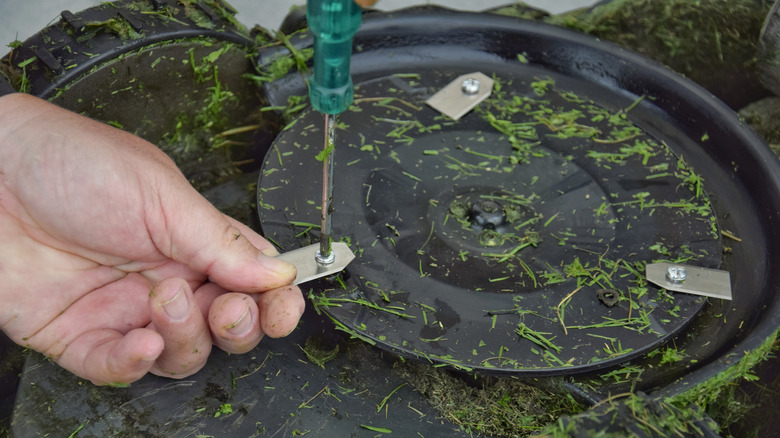Can Lawn Mowers Get Wet? Here's What You Should Know
We may receive a commission on purchases made from links.
It might seem harmless to run your mower over grass that's wet from morning dew or rainfall, but water and lawn equipment don't mix as well as you might think. Gas- and electric-powered lawnmowers are built to withstand the elements, but they're far from entirely waterproof. Getting your lawnmower wet can do more than make it hard to start — water can seriously shorten your mower's lifespan and mess up your yard in the process.
Blades of grass droop and bend with the weight of water droplets instead of standing tall; this makes it harder to get a clean, even cut. You'll often end up with torn grass, damaged blade tips, and/or stressed or bare patches. Wet clippings also clump together, smothering healthy grass and gumming up the works underneath your mower's deck and in the discharge area. In short, if your lawn and/or mower are wet, you're better off waiting for everything to dry before tackling this routine task.
Moisture can wreck your lawn and mower
When you cut wet grass, the moisture causes clippings to stick to the underside of the mower deck. It will build up into a heavy mass there, dulling the blades quicker than usual and putting excess strain on the motor. Those same clumps can block airflow and weigh down the machine, making push mowers harder to maneuver. Over time, that kind of wear adds up, especially if you mow wet grass regularly. It's one of the biggest mistakes people make with their lawn mowers.
Your lawn mower is not the only thing at risk here either. Running wheels over soggy soil compresses it excessively, which can lead to drainage issues or weak root growth in the long run. On hills or sloped yards, there's also the real risk of losing control of a riding mower or falling while working a push mower, either of which can cause serious injury. Even if the grass feels just a tiny bit damp, it's better to be cautious. Experts recommend using a hydrometer to test the ground; if it's too wet to mow, spend the time edging, pulling weeds, or raking instead.
What to do if your lawnmower gets wet
Rain, humidity, or water from sprinklers or hoses can cause major problems for gas-powered and electric mowers. Water can sneak into the air filter, fuel tank, carburetor, or even the cylinders if a spark plug is loose. Water in any of these places can lead to ignition trouble, misfires, or even hydrolocking. In some cases, water mixes with the engine oil and turns it cloudy and milky; this might mean an engine replacement or teardown and rebuild. If water has gotten inside the engine cylinder or cylinders, remove the spark plug or plugs, spray some WD-40 in each cylinder, and pull the starter cord gently a few times to help expel any hidden moisture. As always, an ounce of prevention is worth a pound of cure, so store your mower somewhere dry to prevent problems before they start. It's helpful to cover it with a tarp or wrap the engine in a heavy trash bag to help keep moisture out, even if it's in a shed or garage.
Electric mowers are even more dangerous than gas mowers in wet conditions, whether they're battery-powered or corded. Just a bit of moisture in the wrong spot can short out internal wiring or damage the battery, requiring extensive repair work. There's also the danger of electric shock, particularly with high-powered corded mowers. If your electric mower does get soaked, the first step is to shut it off and disconnect the power source immediately. Then, wipe it down thoroughly, take out the air filter, remove the motor cover, and let the machine air dry completely in the sun. WD-40 can also help with electric mowers by flushing water away from wiring, switch contacts, the motor coil, and other sensitive components.


